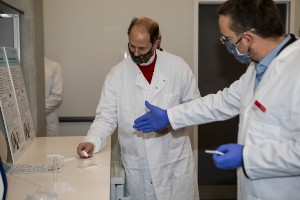The Earl of Wessex visits Reading scientists fighting COVID-19
04 December 2020

His Royal Highness The Earl of Wessex met coronavirus-focused scientists when he visited the University of Reading today (Friday 4 December).
The Earl had a socially-distanced tour of the Health and Life Science Building, home to brand new teaching and research laboratories that have remained open to staff and students throughout the UK’s recent lockdown, including for work on research into COVID-19.
His Royal Highness met a small group of students from the School of Biological Sciences as they took part in practical biology class studying the physiology and evolution of birds, with some students learning face-to-face with their tutors in the lab, while others joined the class online. The Earl also visited the revamped Cole Museum of Zoology and met its director, Professor Amanda Callaghan.
Accompanied by the Vice-Chancellor and Lord Lieutenant of Berkshire, The Earl also met scientists working on new testing technology for the coronavirus, and had a chance to see different prototype diagnostics kits in action.
Among the scientists he met were:
- Dr Al Edwards and Dr Sarah Needs, from the School of Chemistry, Food and Pharmacy, whose study of the effectiveness of home testing kits was part-funded by University alumni and supporters
- Professor Ian Jones, whose virology lab has been studying SARS-CoV-2 since its emergence almost a year ago
- Professor Rainer Cramer and Henriette Krenkel, whose work on novel testing systems is supported by the UK government’s ‘moonshot’ research programme
- Dr Simon Clarke, who has become a leading commentator in public and the media on the science of the virus
- Professor Jon Gibbins and Dr Sakthi Vaiyapuri, blood cell researchers, who have studied the dangerous impacts and treatments needed in some COVID-19 patients.
Dr Vaiyapuri also spoke to The Earl about his work to protect snakebite victims, by developing a new simple test to see if a snakebite victim has been injected with lethal venom, and encouraging people in rural India to seek lifesaving treatment.
Mr James Puxley, the Lord Lieutenant of the Royal County of Berkshire, said: “Today we saw first-hand the passion among those at the University of Reading who are applying their ingenuity and skill to the problem of the coronavirus.
“I am extremely grateful to His Royal Highness for expressing his support and interest in this vital work. This is our Berkshire community at its best, with individuals and institutions working together for the common good.”
Professor Robert Van de Noort, Vice-Chancellor of the University of Reading, said: “HRH The Earl of Wessex is always a welcome visitor to the University, and it was an honour to introduce him to colleagues and students who are exploring areas of science that have grown in prominence over the past year.
“I am proud of the work they and many others at the University have done, both to find innovative solutions to the pandemic, and in maintaining our world-class research and teaching.”
#WeAreTogether: The University of Reading has been contributing cutting edge research, volunteers and initiatives to help tackle the Covid-19 pandemic and its effects. Find out more here.
Image caption: HRH The Earl of Wessex (L) with Dr Al Edwards (R) in a lab inside the new Health and Life Sciences building at the University of Reading
